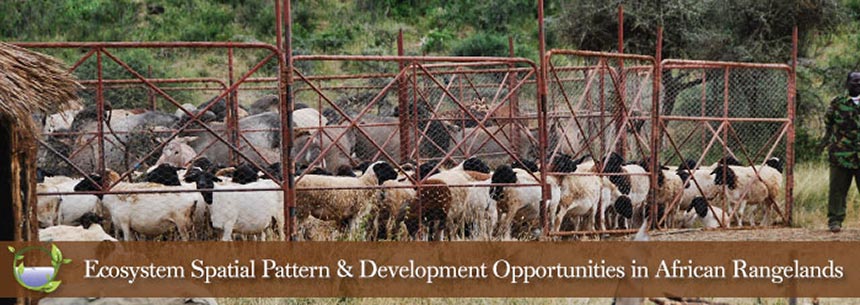Ecosystem Spatial Pattern and Development Opportunities in African Rangelands
2013-15 New Investigator Award
One of the important developments in environmental science over the past decade is the realization that regular, self-organized spatial patterns in vegetation—long predicted by theoretical models—are in fact quite common in nature. Such patterns are especially common in arid and semi-arid systems, where they determine the distribution of food resources for livestock and wildlife alike.
Robert Pringle and his colleagues are investigating both the causes and consequences of these patterns: how they form; how they influence the behavior and foraging decisions of livestock and wildlife; and their emergent effects on the productivity of entire ecosystems.One key prediction, which the researchers seek to test experimentally, is that uniform spatial patterning of resource-rich “vegetation hotspots” in East African rangelands serves to maximize the carrying capacity of mammalian herbivores. Such hotspots are created naturally by termites, but are also created by people though the practice of corralling cattle at night, which concentrates nutrients locally and creates productive glades that can last for decades.
Research confirming the importance of spatial pattern in maintaining high densities of wildlife and livestock would provide a tool that land ranchers could use to manage their lands simultaneously for both livestock production and wildlife and ecotourism.
Educational Impacts
Through this new investigator award, Pringle is developing a novel seminar course, “Patterns in Nature” planned for 2014. In addition, they will incorporate the project research into new modules for two existing courses, EEB 321 (Pringle’s ecology course) and EEB 325 (Tarnita’s mathematical modeling course). Involvement of undergraduate students at all stages is central to the proposed field research.
Participating Department
Collaborating Institutions
- Mpala Research Centre (Kenya)
- Gorongosa National Park and the Gorongosa Restoration Project (Mozambique)
Related Media and Press Coverage
- “Understanding animal coexistence with a little dung and a lot of DNA” — Princeton University (Oct. 26, 2015)
- “Princeton Graduate Students, Postdoc on a Mission of Learning and Restoration in Mozambique” — Princeton University
- “Termites Are Guardians of the Soil” — New York Times (March 2, 2015)
- “How lowly termites save grasslands for lions, elephants, and people” — Christian Science Monitor (Feb. 5, 2015)
- “Mounds of soil made by termites found to hold back encroachment of the desert, scientists find” — Independent (UK) (Feb. 5, 201
- “Antelope and Lion Have Unlikely Meeting—Only One Walks Away” — National Geographic (Aug. 20, 2014)
- “Elephants Eat the Strangest Things” — Slate (July 4, 2014)
- “An Unexpected Feast: Africa’s Poison ‘Apple’ Provides a Win-Win for Elephants and Livestock” — Nature World News (June 25, 2014
- “When the elephants are gone what will pastoralists and ranchers do?” — Wildlife News (June 23, 2014)
- “Africa’s Poison ‘Apple’ Provides Common Ground for Saving Elephants, Raising Livestock” — Princeton University (June 23, 2014)
Participants
Research Associates
- Tyler R. Kartzinel
- Ryan A. Long






